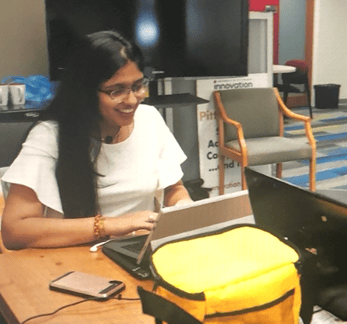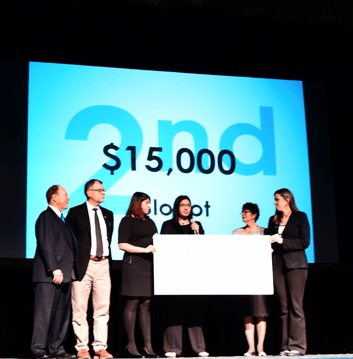
Born into a family of entrepreneurs, I am a third-generation engineer and an entrepreneur. At the age of 3, I was expected to have formal attire. And by the age of 5, I was groomed into having proper etiquette. I started learning about the basics of entrepreneurship, walking into the office, and having weekend conversations with my grandfather. And dad always stirred my mind with interesting management and system thinking books, rather than fiction. At the age of 10, I was given books like "Winnie-the-Pooh on Management: In Which a Very Important Bear and His Friends are Introduced to a Very Important Subject" by Roger Allen. It was always made clear to me that entrepreneurship was the way in life. I did not know the exact meaning of entrepreneurship until I was 13 when I attended a camp at the Indian Institute of Management (IIM), a prestigious management institute. This camp had reiterated a lot that I had learned in childhood. However, it was an assimilation of everything, and helped me learn about concepts such as pitching, profit, loss, risk, and other basic entrepreneurship concepts. This is where I turned my first real profit with the business project we set up at the end of the camp. Following this, I participated in multiple entrepreneurship competitions at my school and was also labelled as “Entrepreneur of the Year” during my sophomore year in high school.
Entrepreneurship was something I wanted to continue pursuing as I walked into The University of Pittsburgh. Although I was completely unaware of the Innovation Institute or anything about Pitt's campus 4 years ago, I slowly got introduced to the community during my freshman year when I had signed up to receive email from a dozen committees. Shortly after, I received my first email from the Innovation Institute. That was it; the fire was lit. I had the opportunity to come up with my next big idea and take a real dive into the world of entrepreneurship.
The first Innovation Institute event I attended was a student and professor mixer. There I was, a freshman swooping in a crowd of graduate students and professors. It was hard to realize what I was even doing there. However, while I was there, I was able to meet Babs Carryer, and she saw this fire in me. I explained to her my passion for entrepreneurship and she generously invited me to a Big Idea Center Living and Learning Community (LLC) event. While I was at the LLC event, I was able to meet like-minded students interested in entrepreneurship. We did some fantastic brainstorming and learned about how the entrepreneurship process worked. This marked the start of my entrepreneurial journey at Pitt.
I looked forward to the next event with much excitement -- I wondered what it would be like. I competed in the Big Idea Center’s Big Idea Blitz competition where I was able to pitch an idea, form a team, and convey our idea to a panel of judges all within a span of 24 hours! Overall, I was decently surprised to see the types of innovative ideas people came up with at such a young age and hardly any experience! During Blitz, I decided to join a team that had a medical drug idea. This idea was a medication that would provide a sustained release of diabetic medicine. We had 24 hours to complete the project and present it to a panel of judges. The zeal and enthusiasm my team showed was incredible. At the end of the day, we did not care if we won or lost; all we wanted was to pitch our idea and gain feedback from these fantastic judges. They had firsthand experience with being an entrepreneur so hearing their insight was extremely valuable to us. Although my team did not win, this competition was just a stepping stone to getting me off my feet.
At the beginning of the spring semester, I saw a sandwich board out on the sidewalk advertising the Randall Family Big Idea Competition (RFBIC) every single day on my way to class at the Gardner Steel Conference Center. At first, I had no clue what it was. But I did know that I wanted to be a part of it. At that point, however, I was debating whether I wanted to focus on my classes instead of participating in the RFBIC. After going back and forth with myself, I ultimately decided to wait to do the RFBIC until next year (I realized that I was wrong back then). The next year, I was DESPERATE to dive into the competition. I had waited long enough, and I met up with a friend who had a vague project idea with some customer discovery. However, she had no clue what the product did. So I went along with her to pitch the idea in the first round of the RFBIC. As expected, the judges had asked "So, what does this product do?" Although I saw this question coming, I had never thought of how to answer the question sufficiently. My team was very nervous after leaving the first round, and we decided that regardless if we win or lose, we will take this idea forward. Luckily, we ended up getting called back for the second round and advanced to the final round. Once we were in the final round, all we wanted to do was win. We had a mentor assigned to us, and we went ahead and met with him not once but three times a week to get a much better insight into the industry we were working with and got our idea rolling in the right direction. We were all prepared for the big day, and we presented our final presentation. We waited anxiously for the results – unfortunately, they were not in our favor.
However, not winning the RFBIC didn’t discourage us. Instead, we were just more prepared to go forward with this idea and pitch it to the world. So, when we were informed by Babs about Blast Furnace, a summer-long learning experience for student entrepreneurs to advance their idea, I was ready to jump right in! I had cancelled my plane ticket to go back home to India for the summer. All that mattered now was being a part of this. While in Blast Furnace, I learned something new each day from the entrepreneurs in residence (EIRs). Whether it was Jeanine McCreary, Don Morrison, Phil Marzolf, or Babs Carryer, they improved our idea and taught us a better way to take it forward. At the end of the program, we were finally ready to present our idea at the investor's presentation. After our presentation, we were called by Rich Lunak and the Idea Foundry to work on our idea with them.
After completing the Blast Furnace program, I was off to India and put my knowledge about all things entrepreneurship and innovation to the test. Over the summer, I had travelled to multiple villages within India and realized that among the widespread and diverse population, there was a market gap for inaccessibility to proper healthcare. This glaring gap along with my entrepreneurial drive pushed me to meet with doctors and learn more about the problem. When I came back to the US to start my fall semester, I decided to come up with an idea to develop a point-of-care complete blood count device for this population. With all of the firsthand research and experience that I acquired over the summer, I was excited to work on this new idea and eventually take it to the RFBIC. Once the RFBIC arrived, I pitched the idea at the first round by myself and the judges ended up liking it so I advanced to the second and ultimately the final round. Now at this point I needed a team so I reached out to my friend with whom I worked with the first time I did the RFBIC. The idea was to capture the missing gap of 150 million dollars that India had for point-of-care, and I got another kick to take this forward when I met with our mentor, Don Taylor.
We practiced, and, with our mentor’s expert inputs on our presentation techniques, we were prepared. We went ahead and presented our big idea during the final round and waited to hear the results. When Babs was about to announce the second place winner, I was kind of disheartened; I was almost ready to leave when I heard our name I got up. I screamed with exuberating joy! Instead of politely walking up to the stage, I literally ran forgetting all about formalities. We won $15,000!

That summer, I was a part of Blast Furnace again, this time with my new idea. However, towards the end of the summer, I researched the Indian and African markets traveling there physically. I found out that the money needed to perform this research was enormous. Towards the end of the summer semester, I realized that a more significant corporation known as Siemens Healthineers had commercialized a similar idea to mine and was ready to launch it. Although I was disappointed that I would not be able to continue with my idea, knowing that such a big corporation like Siemens had the same solution as me was validation that my research was headed in the right direction and that I had recognized the correct market gap. Realizing that inspires me to go forward and take on another endeavor.
For me, all that matters in the end is what I learned from the experience. Innovations and companies can be both bought and sold, but the knowledge still remains. Additionally, I am grateful for my family, friends, mentors, and teachers that I have met throughout my entrepreneurial journey thus far and the vast knowledge and support that they have provided along the way. Although this is just the beginning of my real entrepreneurial journey as it is one that never ends.